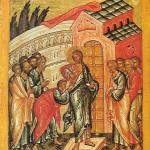As the commentary rolls in on the election of Pope Francis yesterday, there are two thought trains that literally poop on the Pope Francis conversation. Both likely don’t know about each other and would probably start by hating each other’s guts. I think they’re a match made in heaven.
The first set of conversation poopers are the progressive critics. These are the people who don’t like Pope Francis because of his opposition to same-sex marriage, same-sex adoption, abortion, euthanasia, contraceptives, etc. when he was in Buenos Aires. Some also accuse him of not doing enough during Argentina’s Dirty War to protect some Jesuits under his care (in all fairness, though, The New Republic‘s piece is pretty fair). These usually come back to a lament of his disapproval of liberation theology, i.e. his humility is just conservative hierarchy-buttressing in disguise. And so the web has been afloat with plenty of commentary, news, and memes about how you can’t expect the church to amend its sexual and political conservatism under Pope Francis’s pontificate.
The second bunch are a narrow group of evangelicals. While there has been some high praise of Pope Francis from evangelicals (Geoff Tunnicliffe of the World Evangelical Alliance is even going to the installation), a few of the neo-Reformed crowd have been issuing condemnations of the papacy more generally. Al Mohler came out today with a statement on how the office is “unbiblical” and detracts from justification by faith alone. John Piper clarified remarks he had made in a video some time ago on the papacy and how Catholics are heretics if they don’t believe in his understanding of the imputation of God’s righteousness to Christians by faith alone. Apparently, Brad Gregory’s critique of Reformed theology’s hyperpluralism notwithstanding, the alone piece on justification by imputation is the definitive interpretation of Reformed theology. Everyone else is a heretic.
These conversation poopers should really talk to each other. I mean, instead of listening in to the conversation that’s happening around the election of Pope Francis, they condemn their version of him. Progressive activists and conservative neo-Reformed evangelicals make for strange bedfellows, to be sure. But reading them parallel to each other, I feel like the matchmaking company Love Solutions in How I Met Your Mother.
Meanwhile, here’s the conversation they’re missing–a great conversation that, by the way, the purportedly anti-Christian, anti-Catholic media are also reporting:
- Catholic-Anglican dialogue. Archbishop George Venables, the Anglican primate of the Southern Cone, describes in a letter how Cardinal Bergoglio didn’t think Anglicans needed a separate “Ordinariate” and that they had an integral place in the church universal, despite the fact that the churches remain estranged. In the midst of schism in the Anglican Communion itself, a conversation is starting to build around Pope Francis’s outreach to Anglicans. Justin Welby, the Archbishop of Canterbury, has voiced his friendship and partnership, as have the more liberal provinces (here’s Archbishop Katherine Jefferts Schori from the United States and Archbishop Fred Hiltz from Canada) as well as more conservative ones like Venables’s. Plus, Welby’s journey to Canterbury is also beginning to mirror Pope Francis’s in Rome, beginning with a journey in prayer to rural parts of England and being the bishop among the people. I can’t help but think that Pope Francis’s papacy will be helpful in reconciling the antagonistic elements of the contemporary Anglican crisis.
- Jewish-Christian relations. There is an overwhelmingly positive Jewish response, beginning from the Jewish community in Buenos Aires describing Bergoglio as their friend in inter-religious reconciliation and collaborative poverty work. Rabbi David Rosen is now celebrating that this friend to Jews is now in the papacy, and President Shimon Peres has already extended an invitation to Pope Francis to visit Israel. There was a sense that with the end of Benedict XVI’s papacy, there wouldn’t be a pope who cared about Jewish-Christian relations and the implications of the Shoah. That won’t be Pope Francis. It’s his first day on the job, and he’s already reached out to Italy’s chief rabbi.
- Catholic-Pentecostal conversation. There has been a lot of reporting on how this pope’s Latin American background will make him well-poised to tackle the challenges of secularism and rising Pentecostal defection from Catholicism in his home region. It may come as some surprise that the Catholic hierarchy has long seemed sympathetic to new charismatic movements (see, for example, The Ratzinger Report). However, what’s unique here is that University of Southern California professor Donald Miller is even pointing out the remarkable similarities of this pope with the Pentecostal tradition. In fact, cardinals in the conclave like Timothy Dolan, Donald Wuerl, and Francis George have been talking about the central role of the Holy Spirit in surprising the conclave with Bergoglio’s election. What’s more, Argentine evangelist Luis Palau counts Bergoglio as a personal friend and fellow mate-drinking Bible-reader. The charismatic conversations will be one to watch in the future.
- Pope Francis’s AIDS patients’ footwashing session. For all the hype about Pope Francis’s disdain for same-sex marriage and gay adoption, much has also been made of the pope’s foot-washing session for AIDS patients and drug addicts. He has also accused priests in Buenos Aires who don’t baptize illegitimate children of being “hypocrites” more interested in clerical privileges than in being with the people like Jesus was. This goes hand in hand with his humility, taking the bus even after he was elected pope. In light of Pope Francis’s journeying with his people–people who might describe themselves as sexual minorities–one wonders if some re-reading of his statements on same-sex marriage and adoption are in order. In fact, Kimberley Knight’s queer prayer for Pope Francis might be an interesting starting place for that endeavour.
- Pope Francis’s refocus on the cross. In his first homily today, Pope Francis reflected on carrying the cross with Jesus. For Francis, this is the mark of discipleship, one that the hierarchy has to follow instead of trying to show off their regalia. What most people don’t catch is that this refocus is already an attempt to reform the Roman Curia. Piety is political. It is also evangelical. That means, of course, that the Mohlers and the Pipers issued their condemnations before listening, which strikes one as categorically uncharitable, and thus un-Christian.
- Pope Francis’s theology of the episcopacy. As I noted in yesterday’s post, Pope Francis seems to believe very strongly that he and the popes before him were first the bishops of the church in the city of Rome. As with the theology of the cross, this is a theological clarification that is likely a first step at reforming the Curia and decentralizing the hierarchy. As Joan Chittister noted in a post today in the National Catholic Reporter, people have been waiting for this pope and for him to take action. I submit to you that he has already begun.
In the Supper of the Lamb, Robert Farrar Capon, an Episcopal priest, proposes that if there are two very annoying people always pushing their political agendas on a dinner party, the trick is to invite both and seat them next to each other. Whatever their actual political persuasions, they will likely become a couple and live with each other happily ever after, thereby relieving the rest of the party from their monopoly on the conversation.
That is precisely what I have proposed.















